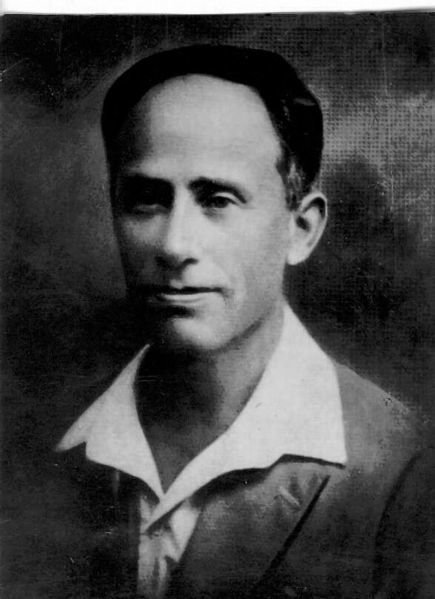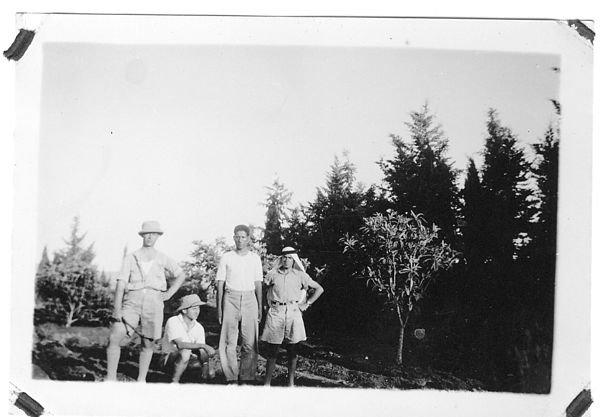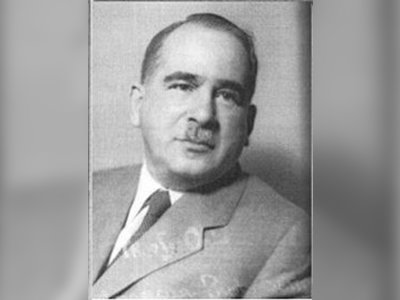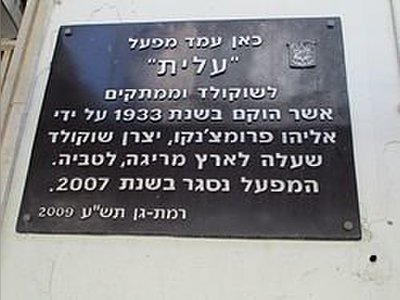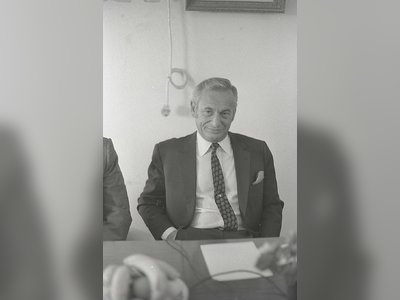Eliezer Lipa Yaffe
Was a Zionist activist, one of the early agricultural settlers in the land of Israel, a member of the pioneering groups in Degania, a planner of workers' settlements, one of the founders of Nahalal, and the visionary and first manager of "Tnuva."
Early Life:
Eliezer Lipa Yaffe was born in the village of Yanoaitzi (Ivano-Frankivsk, Galicia), in the Chortkiv district of the Russian Empire. His family had a strong rabbinic lineage; his paternal ancestors included Rabbi Mordechai Yaffe, one of the great halachic scholars of the 17th century, who lived in Prague. Eliezer's father, Reuven, was a highly learned scholar who earned a living as an accountant.
His mother, Sarah, was known for her kindness, generosity, and wisdom. Yaffe was raised in a traditional Jewish environment and began studying the Talmud at a young age. His parents hoped he would receive rabbinic ordination like his older brothers.
He was described as a youth with a generous heart, love for others, creativity, and a keen interest in innovation, such as creating a flowing pen, a fishing basket, a baking oven, and more.
Youth and Early Zionist Involvement:
During his teenage years, Yaffe became deeply involved in Zionist activities, including the early Zionist congresses, the Dreyfus Affair, and the awakening of Zionist youth. He expanded his knowledge through Hebrew newspapers and reading books. Nevertheless, his thoughts and language were notably influenced by the Bible, more than the social doctrines of his time.
At the age of 16, Yaffe established the "Dorshei Tzion" society, of which his father Reuven served as honorary president. The society's members often met in the synagogue. Yaffe believed that Zionism carried a personal obligation to ascend to the land of Israel.
During one of the society's meetings, he declared: "My friends and brothers, who among us will be willing to say for the first time, 'If I forget thee, O Jerusalem, let my right hand forget her cunning?' – It was the Babylonian exile who first swore thus and therefore they were rewarded and returned from exile to our land within a single generation... Who among us is ready, in his soul and body, to ascend and revive our land?"
At the age of 20, Yaffe published an opinion piece in the newspaper "Hamelitz," calling on young people to turn to the Zionist enterprise in the land of Israel. Simultaneously, he deepened his knowledge of agriculture, but this awakening towards Aliyah (immigration to Israel) among the youth was met with indifference by representatives of the Zionist movement in Odessa, who advised them to wait.
Studies and Activities in the United States:
In 1904, Yaffe emigrated from Serbia to the United States to study agriculture. Concurrently, he worked to establish organizations that combined Zionist values with agricultural work. Yaffe felt a certain disconnect within the American Jewish Zionist community, believing that American Jews viewed Zionism primarily as a spiritual matter, involving charity and assistance to Jews in distress from other lands.
During the winter of 1908, Yaffe and some of his associates moved to the Jewish colony of Woodbine in southern New Jersey, where they began their agricultural studies at the Baron de Hirsch Agricultural School. The school's board was initially not enthusiastic about Zionist ideas, which made it challenging for Yaffe and his friends to spread their ideals.
However, with time and their academic success, the school's board allowed them to engage in Zionist activities and form study groups. Additionally, the school's board, over time, recommended to the management of the Jewish Colonial Association (ICA) to accept the students as prospective settlers in the land of Israel.
Between 1905 and 1906, during his time in America, Yaffe participated in the large territorialist polemics and worked to strengthen the awareness that the land of Israel belongs to the Jews. He argued, "A healthy people does not receive its homeland but rather finds ways to take it."
Under Yaffe's initiative, the Pioneer Organization was established in 1905 in New York. Some of its initial members came from the ranks of the Revival Organization (Chibbat Zion). The primary goal of the Pioneer Organization was to promote immigration to the land of Israel.
Its establishment took place shortly after Theodor Herzl's death, and at that time, there was a heated debate about settling Uganda within the framework of the Zionist Organization. During their first meeting, the members of the Pioneer Organization discussed organization and planning. In the plan presented, it was determined that the land of Israel would be conquered through physical labor, and they urged the Pioneer groups to act accordingly.
The Pioneer Organization members lived in a collective manner and defined themselves as a settlers' movement within Zionism, distinct from the General Zionist Organization. However, over time, the Pioneer Organization's activities declined, and some of its members joined the ranks of the Zionist Labor Party, where they established a body known as the Labor Pioneer (Halutz) workers.
In October 1908, Yaffe and his associates established the Young Farmers Organization, which aimed to train its members in agricultural work so they could eventually immigrate to the land of Israel.
Another goal was to disseminate their ideas among American Zionists. They hoped that their group would lead to a change in the attitude of the representatives of the Zionist Federation through their extensive activities in additional agricultural schools. The members of the group established several guiding principles for their work:
In the Land of Israel:
In late 1910, Yaffe made Aliyah to the land of Israel with some members of the Young Farmers group. At the outset of his journey, he worked in the Ein Ganim settlement near Petah Tikva, where, at the time, Aaron David Gordon resided. Quickly, a close friendship and intellectual closeness developed between them. Both saw the plight of Jews in the diaspora and their disconnect from productive labor as the root of the problem.
In Ein Ganim, Yaffe experimented with various crops and vegetables. In 1911, he moved to the Kinneret Farm, where he continued his agricultural experiments, particularly with crops like sorghum and peanuts (Yaffe introduced sorghum to Israel for the first time).
Concurrently, he was elected to the committee of the Galilee Workers Association and represented the workers in negotiations with employers. Yaffe saw the Kinneret Farm as an ideal place to fulfill the group's vision. Together with his friend (and future brother-in-law) Elimelech Levine, they requested to work on the farm for one year.
After negotiating with Arthur Ruppin, the head of the Palestine Office of the Jewish Colonial Association, they signed an employment contract. However, in the end, only four members of the group came to Kinneret - three members of the Young Farmers and one from the Pioneer Organization. Experienced workers with expertise in agriculture and life in the land of Israel later joined the group.
The "American Group," as they were called by the settlers of the new Jewish Yishuv (community), introduced and utilized new farming techniques that had not been seen before in the region. They cultivated new crops and established a diversified agriculture, different from the traditional wheat farming that was prevalent at the time.
In addition to their agricultural work, Yaffe and his colleagues established the "Merhavia Society," one of the first collective communities in the land of Israel. The society was based on principles that would later become central to the kibbutz movement, such as common ownership of property, the distribution of labor according to abilities, and the principle of "from each according to his ability, to each according to his needs."
In 1911, the Merhavia Society acquired land near the Arab village of Arraba in the Lower Galilee and began establishing their collective community. The society faced many challenges, including disputes with the Arab villagers over land and water rights. Nevertheless, they persevered and gradually expanded their settlement.
In 1913, Yaffe married Naomi Levine, the sister of his close friend Elimelech Levine, and they had two children together. Yaffe continued to be involved in various agricultural and Zionist activities, including working with the Palestine Office of the Jewish Colonial Association to encourage Jewish immigration and settlement in the land of Israel.
World War I and Aftermath:
During World War I, the land of Israel was under Ottoman rule, and Yaffe, like many other Jewish settlers, faced various challenges and restrictions. Despite these difficulties, he remained committed to the Zionist cause and continued to work for the betterment of the Jewish community in the region.
In 1920, Yaffe was one of the founders of Nahalal, one of the first moshavim (cooperative agricultural settlements) in the land of Israel. Nahalal was designed as a model settlement, with an emphasis on cooperative living and communal values. Yaffe played a key role in planning and developing Nahalal and served as its first manager.
Tnuva:
In 1926, Yaffe took on a new role as the visionary and first manager of Tnuva, which was established as a cooperative organization to market dairy products produced by Jewish settlers in the land of Israel. Under Yaffe's leadership, Tnuva grew and became a significant force in the Israeli dairy industry, helping to improve the economic well-being of Jewish farmers and settlers.
Yaffe's work with Tnuva contributed to the economic development of the Jewish community in the land of Israel and helped strengthen the cooperative movement in the country.
Legacy:
Eliezer Lipa Yaffe made significant contributions to the Zionist movement and the development of the land of Israel. His early involvement in Zionist activities in the United States, his pioneering work in agricultural settlements like Kinneret and Nahalal, and his role in the development of Tnuva all left a lasting impact on the Jewish community in the land of Israel.
Yaffe's commitment to the principles of labor, cooperation, and communal living were central to his vision for the Jewish settlement in the land of Israel. He believed in the transformative power of productive labor and saw it as a means of achieving both individual and collective fulfillment for the Jewish people.
Eliezer Lipa Yaffe passed away on September 10, 1942, leaving behind a legacy of dedication to the Zionist ideal and the development of the land of Israel. His contributions continue to be remembered and celebrated in Israel's history.
- אליעזר יפהhe.wikipedia.org
